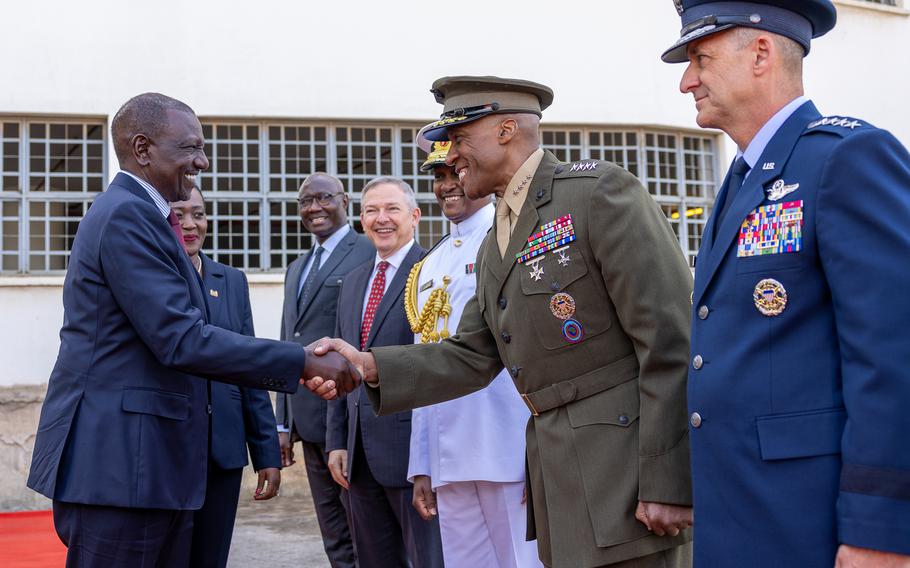
Kenyan President William Samoei Ruto, left, greets U.S. Africa Command leader Gen. Michael Langley, center right, during a defense conference in Nairobi, Kenya, May 28, 2025. Langley said Friday that the U.S. is finding it difficult to monitor the growing terrorist presence in West Africa following its troop withdrawal from the region. (Courtesy photo)
STUTTGART, Germany — Attacks by Islamic militants are surging in western Africa, where the U.S. is struggling to track terrorist movements in the wake of a pullout of forces from the region, the top American general for Africa missions said Friday.
U.S. Africa Command’s Gen. Michael Langley said fighters from a mix of groups are taking over large swaths of territory across the Sahel, which has become the “epicenter” for terrorism in Africa.
Al-Qaida and Islamic State group affiliates are operating in Burkina Faso, Mali, Niger and Nigeria, he said.
“One of the terrorists’ new objectives is gaining access to the West African coast,” Langley said in a call with reporters. “If they secure access to the coastline, they can finance their operations through smuggling, human trafficking and arms trade.”
Such a scenario “increases the chance of threats reaching the U.S. shores,” he said.
AFRICOM’s efforts in the region have been hindered by the 2024 U.S. withdrawal from drone bases in Niger, which were hubs for surveillance across western Africa. A 2023 coup in Niger brought an end to the long-standing American partnership with that country.
“We have lost our ability to monitor these terrorist groups closely,” Langley said.
The concerns over increased attacks in West Africa and a similar situation on the other side of the continent in Somalia come as the Pentagon reassesses its strategy in Africa.
In Somalia, several hundred U.S. troops are part of a mission to help local forces in their battle against the al-Qaida-aligned group known as al-Shabab. ISIS Somalia also has grown there.
President Donald Trump removed U.S. forces from Somalia at the end of his first term as part of an effort to scale back American military commitments abroad. Former President Joe Biden returned U.S. troops to the country amid concerns that al-Shabab was gaining ground.
Langley said AFRICOM has stepped up efforts against the militants in Somalia, launching more than 25 airstrikes so far this year. That’s already more than double the number of strikes conducted in all of 2024, he said.
But lasting success “will require a comprehensive strategy and addressing the root causes of instability,” Langley added.
Somalia has a weak central government and has been in disarray for decades despite international efforts to build up the country.
Langley was in Kenya this week for a meeting with African defense leaders. He did not say whether the U.S would further reduce troop levels, but he emphasized that African militaries will need to shoulder more of the security burden.
“It is essential that all partners around the globe, Africa included, take more ownership in the regional and continental security,” he said.
Such comments are in line with a Pentagon push to get allies and partners to play a larger role in their respective regions so the United States can focus more on China in the Asia-Pacific region.
Defense Secretary Pete Hegseth is reviewing the American military’s force posture worldwide, and that is expected to have implications for missions in Africa.